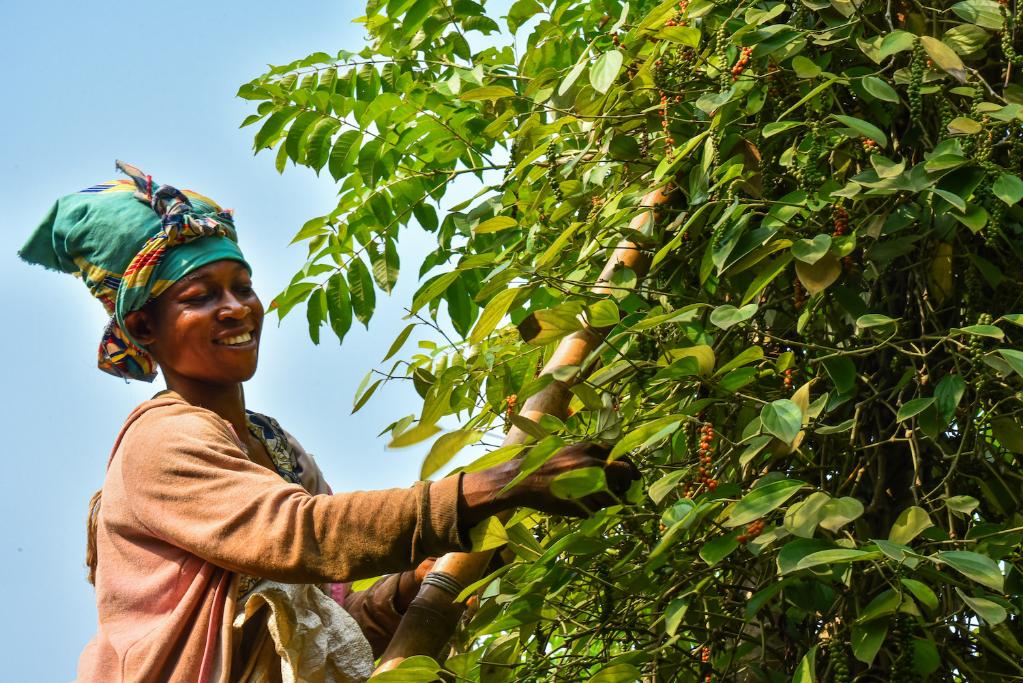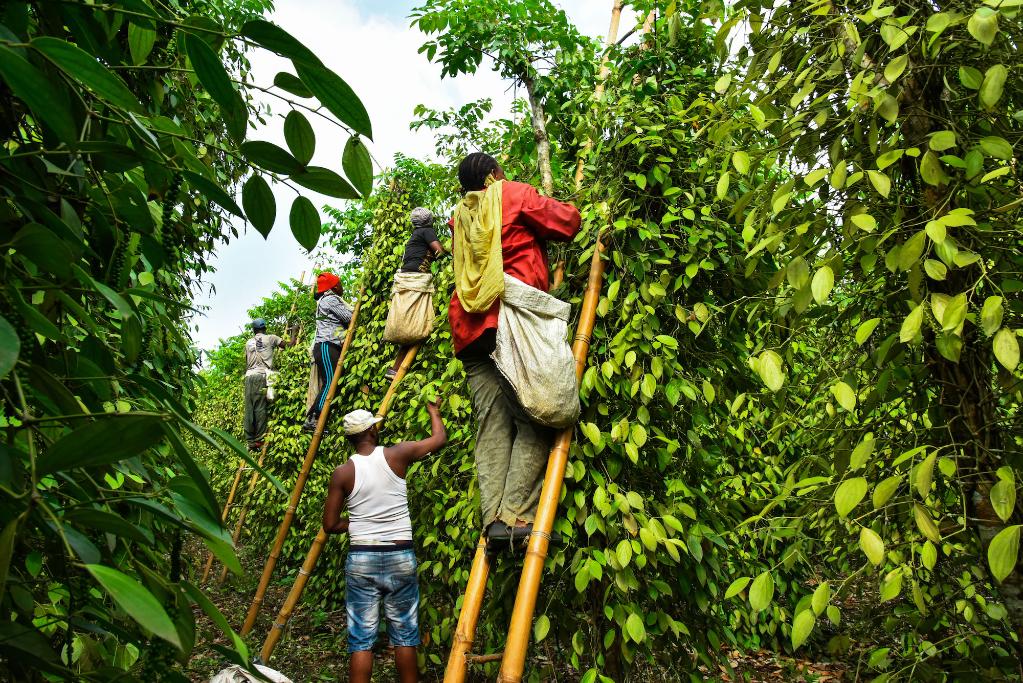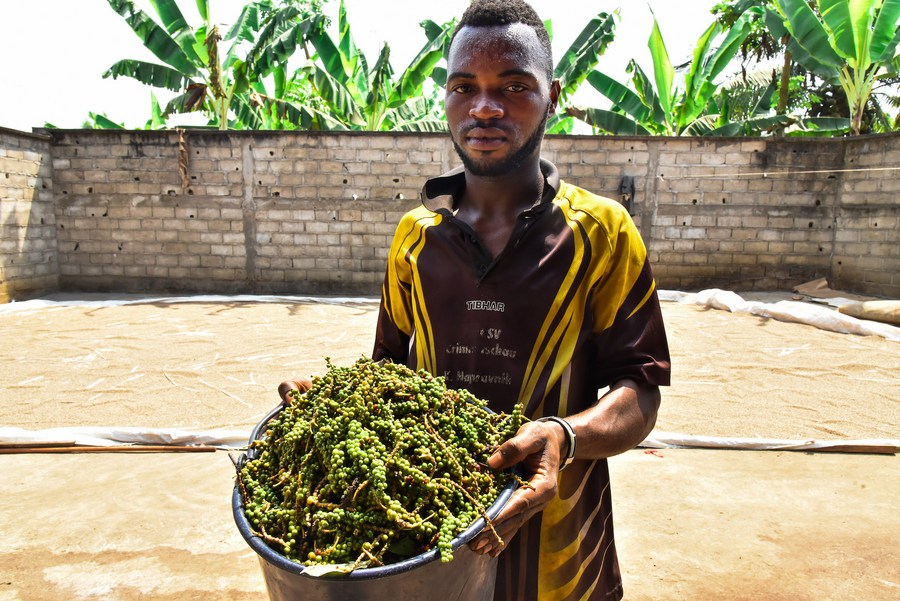
A woman picks pepper fruits at a plantation in Njombe-Penja sub-division of Littoral Region, Cameroon, Jan. 13, 2023. (Photo by Kepseu/Xinhua)
Farmers in the Penja locality of southwestern Cameroon are spicing up their lives with the production of pepper.
YAOUNDE, Jan. 27 (Xinhua) — Jean Claude Tazune, a farmer in the Penja locality of southwestern Cameroon, pointed happily to bags of just-harvested pepper which he planned to supply to supermarkets in the commercial hub of Douala.
It was the crack of dawn on an early January morning as the sun shone on Tazune’s four-hectare pepper farm lying beneath an imposing mountain. Other workers were also busy harvesting pepper.
The father of 12 is one of over 400 farmers who have found fortune in the cultivation of pepper in the locality. “Pepper is my life. It’s pepper season in Penja and this is like World Cup to us,” said the 54-year-old.
Tazune, like many other farmers in the semi-urban locality, used to grow coffee and cocoa but torrential rains, biting drought and a woeful drop in prices took a heavy toll on him and the cash crops.
Then, agrotechnicians arrived in the area and discovered that the land is appropriate for pepper cultivation. Located within the hills and gullies of Moungo division of the Littoral region, Penja boasts a cool, highland climate and a combination of volcanic soil suitable for growing the crop.
Today the zone is famous for its production of white and black pepper fondly called Penja Pepper. In 2013, Penja pepper became the first sub-Saharan African product to obtain a Protected Geographical Indication label from the African Intellectual Property Organization. This allows its producers to sell it at competitive prices.
The Penja Pepper production zone consists of the localities of Loum, Manjo, Mbanga, Njombe-Penja and Tombel which cut across two regions of Cameroon including the Littoral and Southwest.

Villagers pick pepper fruits at a plantation in Njombe-Penja sub-division of Littoral Region, Cameroon, Jan. 13, 2023. (Photo by Kepseu/Xinhua)
Approximately 60 percent of the product is consumed locally and in neighboring countries, and 40 percent is exported to European markets, according to Cameroon’s Ministry of Trade.
Tazune said the price is encouraging and motivating them to work even harder. “When we first got into pepper, a kilo was sold at 12,000 xaf (about 20 U.S. dollars). That price was good for us and it encouraged us to cultivate pepper,” said Tazune who is married to three wives (polygamy is legal in Cameroon). “With one ton (of pepper), you can make six million and you take good care of your family.”
Penja has established pepper planting as a leading industry to help farmers increase their incomes and an impetus for poverty alleviation and rural revitalization, said Richard Medjiotou Mieghu who owns 1.5 hectares of pepper farm.
His family has benefited from pepper growing since 2015. In less than a decade, the once impoverished household shook off poverty and now has a house with modern home appliances.
“I used to live in a house constructed of wood (where less privileged people in Cameroon live). Today I live in a duplex, I move around in my own car. I have sent two of my children to the university and my family feeds well,” said the 50-year-old father of 10.
Overall, the locality produces between 300 and 500 tons annually, according to the Penja Pepper Cooperative.

A man displays freshly picked pepper fruits in Njombe-Penja sub-division of Littoral Region, Cameroon, Jan. 13, 2023. (Photo by Kepseu/Xinhua)
Mieghu said the more the production, the more jobs for young people.
In Tazune’s farm alone, 35 workers including women, men and children were busy at work.
Among them was Noella Dion, a hairdresser by profession who hoped to earn money working on the pepper farms in a bid to open a salon.
“It has helped me a lot. It has helped me to feed my family, save (money) and do other things at home,” said the 24-year-old.
“In Njombe-Penja, the rate of banditry was so high. So, when we create a farm like this one, we employ people and it makes them not to find themselves in any atrocity,” added 35-year-old Gabel whose job is to supervise the workers. “They (workers) make 5,000 to 10,000 xaf a day depending on work output”.
Cameroon aims to increase its exports of Penja pepper and diversify its agricultural exports to niche markets at the regional and international levels. To this end, it must be able to support farmers to ensure high-quality products by providing them with “much-needed” pesticides, Mieghu said. ■
Source link : https://english.news.cn/20230127/89f1a0a0dcde49419eee14eb19d5cdea/c.html
Author :
Publish date : 2023-01-27 08:00:00
Copyright for syndicated content belongs to the linked Source.





